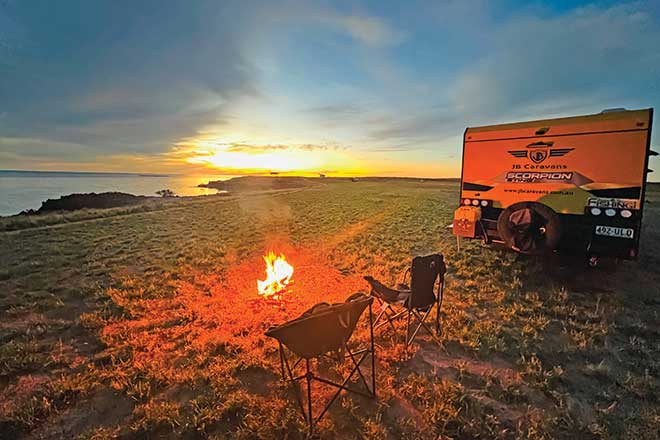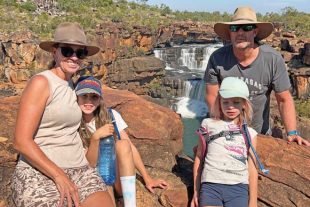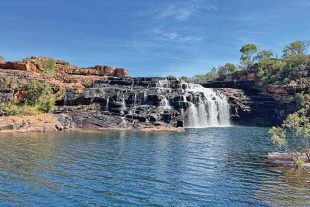After our enjoyable stay at Karijini National Park the plan was to head north.
Once again, following the coastline as we made our way to Broome, which was going to be our base while we explored the area.
Enroute to Broome there were a couple of places that we wanted to check out, the first being Cape Keraudren Nature Reserve.
While the scenery here was spectacular, like most of the western Australian coastline, we needed to manage the mosquitoes, especially around dusk.
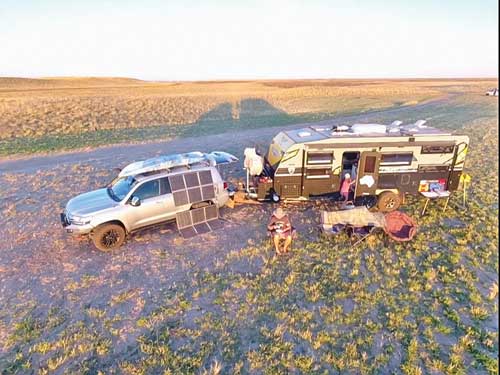
Thankfully we were well stocked with mozzie coils and spray, so sitting around the fire at sunset was still enjoyable.
The coastline was quite rugged, making land-based angling more difficult.
A little car-topper boat would have been ideal here, allowing us to explore a little further afield and get to those truly remote fishing locations.
There’s ample room if you’re planning a visit, but you’ll need to bring your own firewood.
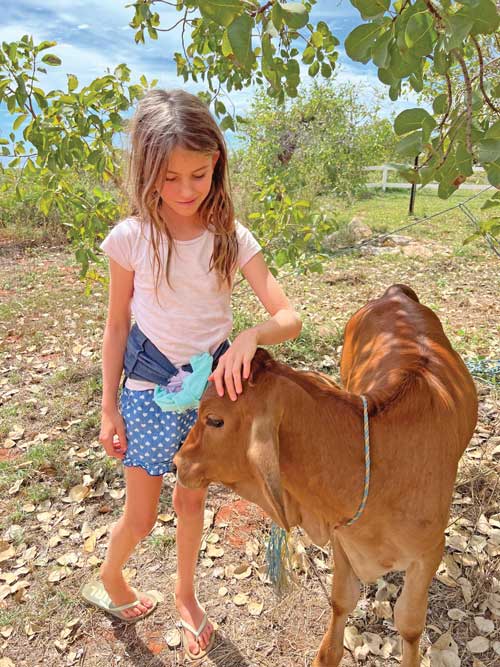
Aside from fishing and relaxing there’s not a lot more to do, but if you’re similar to me, those are the boxes I like to tick.
Our next port of call was Barn Hill Station.
Unfortunately, the Station was still getting sorted after being closed for the wet season and resembled a construction site.
The bowls rink was also closed, which was a bit disappointing as I was looking forward to a roll up.
Despite these minor things, the kids still had an enjoyable time patting the baby goats, playing with the calf and having fun on the beach and in the rock pools.
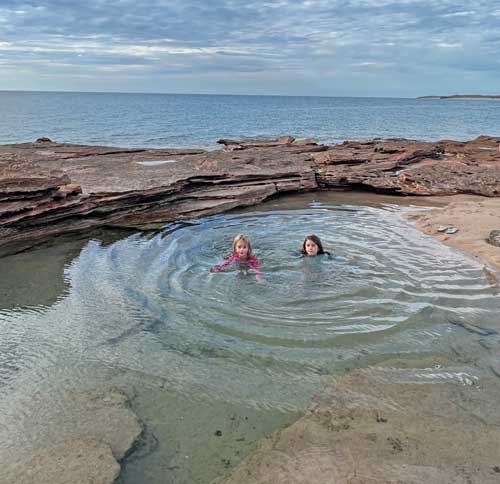
Broome
Our plan was to stock up in Broome and then travel further north towards Cape Leveque to a place called James Price Point.
We hit the dirt and corrugated road heading north, however the road conditions were very average and the journey took longer than planned.
I think the road conditions also hampered anyone getting through to manage or maintain the camping areas as they had all become overgrown.
It looked like no one had been there since the beginning of the wet season.

This made finding a suitable campsite very challenging and we ended up heading back to Broome.
There was a rutted track down to the beach that I wanted to try but was convinced by my better half not to give it a go.
I guess when you’re in remote areas with no one else around and a family to think about you need to make smarter decisions, because if you did break something you may be stuck for several days waiting to be rescued.
Thankfully, we were able to book into Cable Beach Caravan Park, one of the better places to stay in the area.
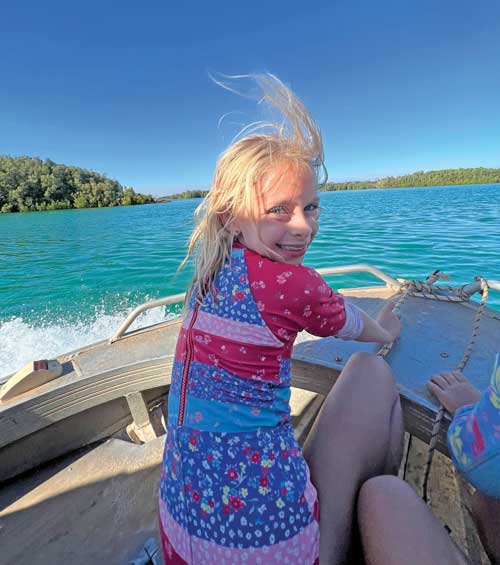
It was a little further out of town, but also a little further away from some of the locals who had a reputation for helping themselves to anything that wasn’t locked or bolted down.
While we had zero issues throughout our trip, we spoke to several fellow travellers who weren’t as lucky.
Just make sure you do a bit of research on places you plan to stay or visit.
It’s unfortunate that a few bad eggs can give others a bad name.
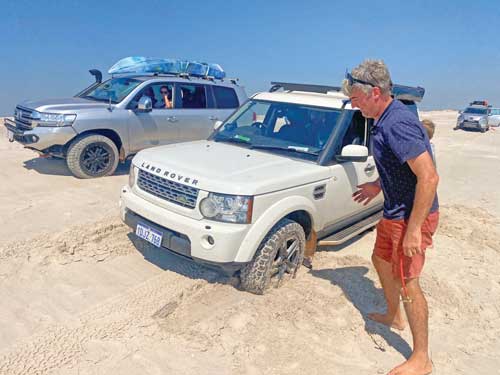
On a more positive note, and since we missed out on camping at Cape Leveque, we managed to book a tagalong tour that allowed us to explore this remote part of the state.
Our tour guide was Brian Lee, a local and elder who is one of the few people who can give you access to this incredible part of the world.
The tour group consisted of a few families, all with 4WDs, who had a thirst for some local knowledge and history.
We weren’t disappointed. cape
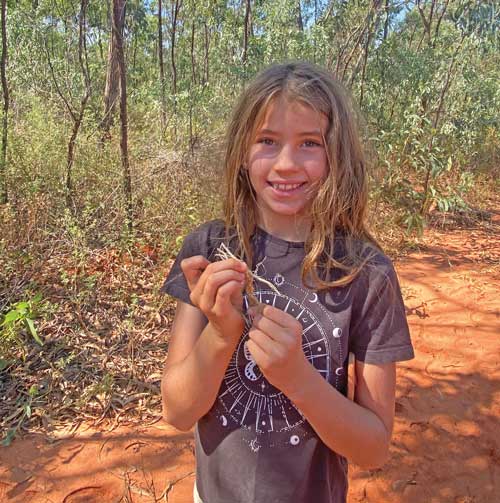
In addition to learning about bush tucker and what kind of tree bark is good for mosquito bites, Brian also showed us different types of animal tracks in the sand.
After our lessons, we ventured further north along the beach until we arrived at a crystal-clear saltwater creek where a couple of Brian’s helpers immediately jumped out of his Hilux ute and went in search of mud crabs.
Eager to see how they did it, I followed along in hot pursuit.
It wasn’t long before one of them was diving into the water with a hand spear after spotting a good sized muddie, which was destined for a hot plate over the fire.
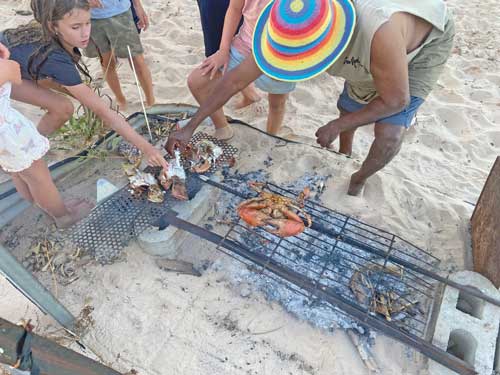
To add to the lunch menu, I ventured out in a kayak with fishing rod in hand, rigged with a soft plastic.
It wasn’t long before I landed a mangrove jack and a couple of trevally, all gratefully added to the food cooking on the fire.
I’ve been fortunate to experience cooking over fires or coals on a beach before, but it was amazing to hear how this was the first time for some people on our tour.
After our feed, Brian showed everyone around the creek, pointing out different animals and plants as we moved along the shallow, clear waterways.

We disturbed a decent sized bull shark on our way up the creek which thankfully looked well fed and was a long way from where we’d been swimming.
In addition to the shark, we spotted various stingrays and fish to make it an enjoyable trip for the young and old explorers.
Once everyone had a chance to check out the area by boat, we were back on the road heading for the Cape Leveque resort (which is now closed and unlikely to be reopened).
The resort ceased operating a few years ago and it’s a shame that it probably won’t reopen anytime soon in this beautiful part of the world.
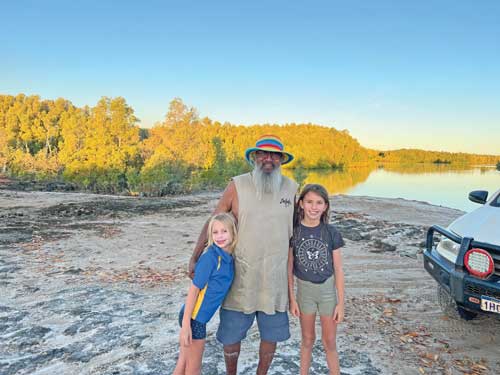
There seem to be many issues plaguing it, including funding, ownership and management which will restrict the project moving forward.
If you want to explore this part of Australia, the tagalong tour is basically the only way to see it at this stage.
I highly recommend the Brian Lee tour; it was educational, suitable for any experience level and enjoyed by kids and adults alike.
If you’re keen, visit tagalongtours.com.au for more information.
 Bush ‘n Beach Fishing Magazine Location reports & tips for fishing, boating, camping, kayaking, 4WDing in Queensland and Northern NSW
Bush ‘n Beach Fishing Magazine Location reports & tips for fishing, boating, camping, kayaking, 4WDing in Queensland and Northern NSW

